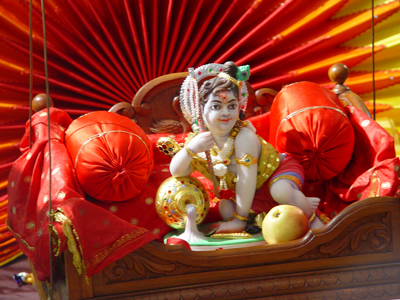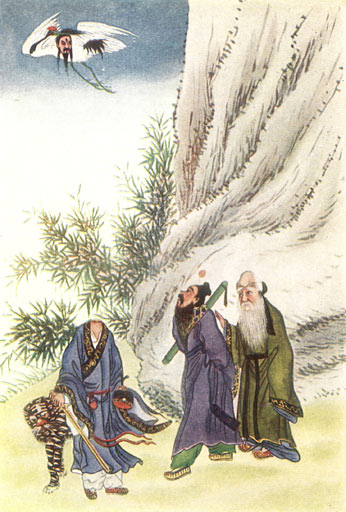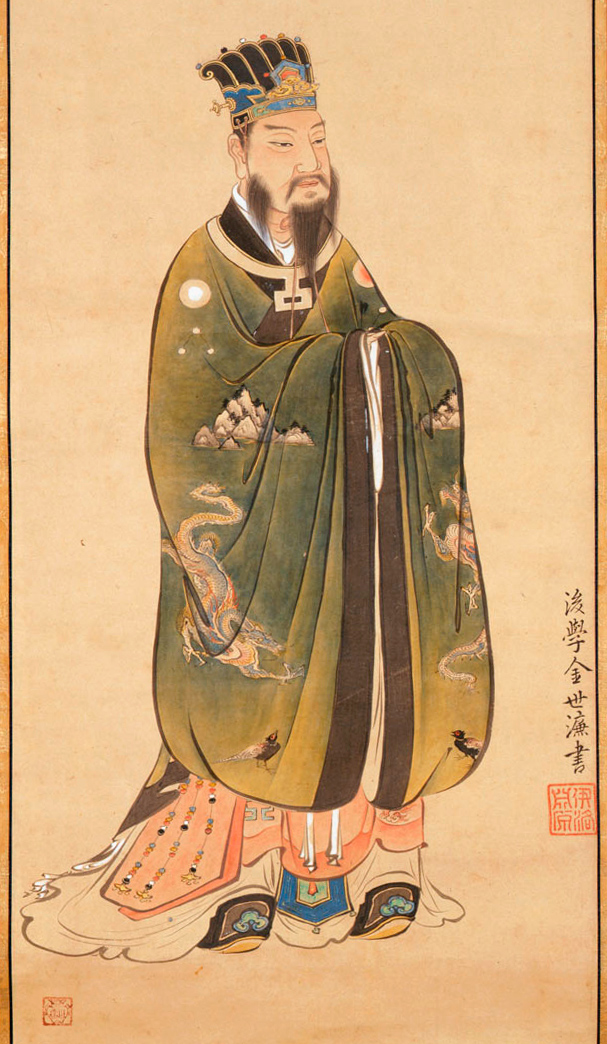|
Gods Of Honour
''Gods of Honour'' is a Hong Kong television series adapted from the 16th-century novel '' Fengshen Bang'' (also known as ''Investiture of the Gods'' or ''Creation of the Gods''), a Chinese vernacular classic written by Xu Zhonglin and Lu Xixing. The series was first aired on TVB Jade in Hong Kong in 2001. It starred Benny Chan, Chin Kar-lok, Irene Wan, Michelle Ye, Dickson Lee, Yuen Wah, Kingdom Yuen and Winnie Yeung in the lead roles. Story Since time immemorial, the history of China has seen many belligerent and licentious tyrants. King Zhou of the Shang dynasty was one of the most notorious tyrant. His tyranny triggered off an epic legend: King Wu of the Zhou dynasty overthrowing King Zhou of the Shang dynasty. In the fierce battle between good and evil, ancient China was gripped by paroxysms of rage and grief. Countless loyal and valiant warriors were sacrificed. Taking pity on the aggrieved mortals, the Celestial Realm laid the Rostrum of Gods of Honour. The story tells a ... [...More Info...] [...Related Items...] OR: [Wikipedia] [Google] [Baidu] |
Shenmo
Gods and demons fiction () is a subgenre of fantasy fiction that revolves around the deities, immortals, and monsters of Chinese mythology. The term ''shenmo xiaoshuo'', coined in the early 20th century by the writer and literary historian Lu Xun, literally means "fiction of gods and demons". Works of shenmo fiction include the novels ''Journey to the West'' and ''Investiture of the Gods''. History ''Shenmo'' first appeared in the Ming Dynasty as a genre of vernacular fiction, a style of writing based on spoken Chinese rather than Classical Chinese. The roots of the genre are found in traditional folktales and legends. Plot elements like the use of magic and alchemy were derived from Chinese mythology and religion, including Taoism and Buddhism, popular among Ming intellectuals. ''The Three Sui Quash the Demons' Revolt'' (, 14th century CE) is an early gods and demons novel attributed to Luo Guanzhong. In the story, Wang Ze begins a rebellion against the government with th ... [...More Info...] [...Related Items...] OR: [Wikipedia] [Google] [Baidu] |
Nezha
Nezha ( 哪吒) is a protection deity in Chinese folk religion. His official Taoist name is "Marshal of the Central Altar" (). He was then given the title "Third Lotus Prince" () after he became a deity. Origins According to Meir Shahar, Nezha is ultimately based on two figures from Hindu mythology. The first is a yaksha from the ''Ramayana'' named Nalakubar, the son of Yaksha King Kubera and nephew of the antagonist Ravana. The link to Nalakubar is established through variants in his Chinese name appearing in Buddhist sutras. The original variant Naluojiupoluo () changed to Naluojubaluo (), Nazhajuwaluo (), and finally Nazha (). The simple addition of the " mouth radical" () to Na () changes the name to the current form Nezha (). The second figure is the child god Krishna. Both Krishna and Nezha are powerful children that defeat mighty serpents, Kaliya in the case of the former and Ao Bing in the latter. The ''Bhagavata Purana'' describes how Nalakubar was rescued from impri ... [...More Info...] [...Related Items...] OR: [Wikipedia] [Google] [Baidu] |
Muzha (deity)
Mucha (), more commonly known as Muzha (), is a short form of Pratimokṣa in Chinese () and also a given name. Muzha as a Historical Figure Mucha was a historical figure in Han Buddhism during the era of Tang Empire and he was an apprentice of , along with Hui-an and Hui-yen. As Master Sangha was seen as an avatar of Avalokiteśvara (Kuan Yin), Mucha was later fictionalized as Kuan Yin's apprentice in the Zajü ''Journey to the West'' during the Great Yuan period. Afterwards, he was further blend with Hui-an as "Mucha Hui-an" () in the Chinese classic novel ''Journey to the West'' during the Great Ming period. Footnotes References Tang dynasty Buddhist monks Investiture of the Gods characters Journey to the West characters ... [...More Info...] [...Related Items...] OR: [Wikipedia] [Google] [Baidu] |
Ngo Ka-nin
Ngo Ka-nin (, born 26 September 1976) is a Hong Kong actor, singer and host. Career Ngo debuted as a radio DJ before he got into acting. He has also been one of the hosts for the entertainment news show, E-Buzz, since 2005 to 2007. Ngo is best known for his role as Chiang Bit-man in the 2009 drama ''Rosy Business'', which earned him the Most Improved Male Artiste award and a Best Supporting Actor nomination at the 2009 TVB Anniversary Awards. His popularity got a further boost when he delivered a sterling performance as Tong Kat in direct sequel '' No Regrets''. He became a strong contender for the Best Supporting Actor award. Ngo left TVB due to pay on 26 January 2020, but has continued working under a per series contract with the first series being ''Fraudstars'', where he starred as the male lead for the first time with the network. Personal life There have been conflicting reports about his age with some stating that he was born in the year 1976. In the reality program ' ... [...More Info...] [...Related Items...] OR: [Wikipedia] [Google] [Baidu] |
Bi Gan
Prince Bi Gan (, Bǐgān) was a prominent Chinese figure during the Shang dynasty. He was a son of King Wen Ding, and an uncle of King Zhou, and served as the Prime Minister of the Kingdom of Shang. He was later worshipped as the God of Wealth. History Prince Bigan was the prime minister of the Kingdom of Shang during the late Shang dynasty, and a member of the Shang royal family. His ancestral name was " Zi" (子). He was the son of King Wen Ding and served his nephew, King Zhou. Zhou, the last king of the Shang dynasty, has been traditionally regarded as notoriously cruel, immoral, and wasteful. According to the account recorded by Sima Qian in his ''Records of the Grand Historian'', King Zhou's minister Prince Weizi admonished him to reform his ways several times, but his admonitions fell on deaf ears. Prince Weizi then decided to withdraw from the court, but Prince Bigan argued that to serve as minister meant doing what was right even if it meant death. Prince Bigan contin ... [...More Info...] [...Related Items...] OR: [Wikipedia] [Google] [Baidu] |
Jiang Ziya
Jiang Ziya ( century BC – century BC), also known by several other names, was a Chinese noble who helped kings Wen and Wu of Zhou overthrow the Shang in ancient China. Following their victory at Muye, he continued to serve as a Zhou minister. He remained loyal to the regent Duke of Zhou during the Rebellion of the Three Guards; following the Duke's punitive raids against the restive Eastern Barbarians or ''Dongyi'', Jiang was enfeoffed with their territory as the marchland of Qi. He established his seat at Yingqiu (in modern Linzi). Names The first marquis of Qi bore the given name Shang. The nobility of ancient China bore two surnames, an ancestral name and a clan name. His were Jiang (姜) and Lü (呂), respectively. He had two courtesy names, Shangfu (尚父; lit. "Esteemed Father") and Ziya (lit. "Master Ivory, Master Tusk"), which were used for respectful address by his peers. The names Jiang Shang and Jiang Ziya became the most common after th ... [...More Info...] [...Related Items...] OR: [Wikipedia] [Google] [Baidu] |
Boyi Kao
Bo Yikao was the eldest son of King Wen of Zhou and the elder brother of King Wu who was the founder of the Zhou dynasty of ancient China. As a member of the Zhou royal house, his family name was Ji (姬). "Bo" refers to his status as the oldest son of his father. "Yikao" may have been his personal name or a posthumous name used for ritual purposes. It is known that he did not inherit his father's realm along the Wei River. Based on later Chinese inheritance laws and legends, it is typically thought that he predeceased his father, e.g. by Sima Qian. Stories such as the ''Fengshen Yanyi'' lay the guilt upon King Zhou, the last king of the Shang dynasty, and the traditional account of his death was taken by later Chinese jurists as the first instance of '' lingchi'' (the "death by a thousand cuts"). However, passages in the ''Book of Rites'' and the '' Masters of Huainan'' assume that King Wu's inheritance simply represented an aberration or even an older tradition amon ... [...More Info...] [...Related Items...] OR: [Wikipedia] [Google] [Baidu] |
King Wen Of Zhou
King Wen of Zhou (; 1152–1050 BC, the Cultured King) was Count of state of Zhou, Zhou during the late Shang dynasty in ancient China. Although frequently confused with his fourth son Duke of Zhou, also known as "Lord Zhou", they are different historical persons. Although it was his son King Wu of Zhou, Wu who conquered the Shang following the Battle of Muye, Count Wen was posthumously honored as the founder of the Zhou dynasty and posthumously titled King. Many of the hymns of the ''Classic of Poetry'' are praises to the legacy of King Wen. Some consider him the first epic hero of Chinese history. Archaeology Chinese scholars (e.g. Wang Yunwu (:zh:王雲五, 王雲五), Li Xueqin (:zh:李学勤, 李学勤), etc.) identified King Wen with a mentioned in inscriptions H11:82 & H11:84 among oracle bones excavated at Zhouyuan (), Qishan County. Biography Born Ji Chang (), Wen was the son of Tai Ren, Tairen and King Ji of Zhou, Ji Jili, the Count of Predynastic Zhou, Zhou, a vassal ... [...More Info...] [...Related Items...] OR: [Wikipedia] [Google] [Baidu] |
Fiona Yuen
Fiona Yuen Choi Wan (; born 20 January 1976 in Cologne) is a German-born Hong Kong model and actress. Yuen went to Hong Kong and took part in the 1996 Miss Hong Kong Pageant, where she was second runner-up and won the Miss International Goodwill award. She speaks German, French, English, Mandarin, Cantonese and Hakka fluently. In 2010, it was announced that she would leave the entertainment and move to Vancouver to start a new life. She is currently under ATV Home, a local Hong Kong television station, as a host and program presenter. Television series * A Kindred Spirit (1995) *Rural Hero (1998) *The Legend Of Lady Yang (2000) * A Matter of Customs (2000) *Crimson Sabre (2000) *Healing Hands II (2000) *Gods of Honour (2001) *At Point Blank (2001) * Lofty Waters Verdant Bow (2002) *The 'W' Files (2003) *The Vigilante in the Mask (2003) * Fight for Love (2004) *Love and Again (2004) * Split Second (2004) *Placebo Cure(2004) * Always Ready (2005) *Just Love (2005) *Guts of Man (20 ... [...More Info...] [...Related Items...] OR: [Wikipedia] [Google] [Baidu] |
Pipa Jing
Pipa Jing ( zh, c=琵琶精, p=Pípa Jīng), or Wang Guiren ( zh, c=王貴人, p=Wáng Guìrén), is a character featured within the classic Chinese novel ''Fengshen Yanyi'' ( Investiture of the Gods). She is a yaojing (seductive spirit) changed from jade pipa, who later becomes a favorite concubine of King Zhou of Shang. Character Pipa Jing is one of three renowned female spectres under the legendary Nüwa. Encounter One time, when Pipa Jing returned from a visit with her friend Daji (a malevolent fox spirit), she happens to find Jiang Ziya with a large crowd of people around the fortune telling studio. Thus, Pipa Jing turns herself into a very attractive young woman and approaches Jiang for a fortune divination. Unfortunately for Pipa Jing however, Jiang sees that she is truly an evil spectre in disguise; but continues the palm reading. Once Jiang becomes more forceful and will not let go of Pipa Jing's palm, she begins to scream and ask for help from the people around ... [...More Info...] [...Related Items...] OR: [Wikipedia] [Google] [Baidu] |
Angela Tong
Angela Tong (born 30 June 1975) is a Hong Kong actress. She was born in Montreal, Quebec, Canada with family roots in Shunde, Guangdong, China. She was Miss Chinese Montreal 1995. She was educated in Concordia University. Pageant life After winning the 12th place in Miss Chinese Montréal Pageant in 1994, Tong represented Montréal to compete in the Miss Chinese International Pageant 1995. Although she only reached the Top 12 in the pageant, she was approached by TVB with an acting contract. Acting career Tong has been in numerous TVB dramas since 1995, but mostly supporting roles and is mostly cast as a showgirl or " the other woman". After for 10 years, her big break finally came with the TVB series ''Life Made Simple (阿旺新傳)'' playing a physically unattractive girl with a heart of gold and a wonderful singing voice called "Lee Siu Ho (李笑好)". The role won her critical acclaim, winning the Best Supporting Actress award at the TVB 37th Anniversary Awards in Novemb ... [...More Info...] [...Related Items...] OR: [Wikipedia] [Google] [Baidu] |
Li Jing (deity)
Li Jing, also known as Pagoda-Bearing Heavenly King Li is a figure in Chinese mythology and a god in Chinese folk religion. He carries a tower that can capture any spirit, demon or god within its walls. He also appears in the classic Chinese novels ''Journey to the West'' and '' Fengshen Yanyi'' (''Investiture of the Gods''). He is an analogue of Vaisravana. Mythology Li Jing is renowned throughout the Shang Dynasty as a high ranking commander officer of the Old Pond Pass. His wife is Lady Yin, and he has three sons, Jinzha, Muzha, and Nezha. Throughout his past, Li Jing had studied under Superiorman Danger Skipper of Mount Kunlun, and had soon become a master of exceedingly fast underground travel (even to the extent of traveling thousands of kilometres without a single individual noticing). In time, Li Jing would have a third son by the name of Nezha, as destined by the heavens. He and Nezha's relationship began as rocky because Nezha is disobedient and short-tempered. Ne ... [...More Info...] [...Related Items...] OR: [Wikipedia] [Google] [Baidu] |



.jpg)

.jpg)
_(16135565965).jpg)